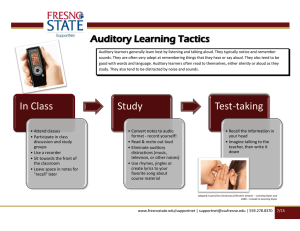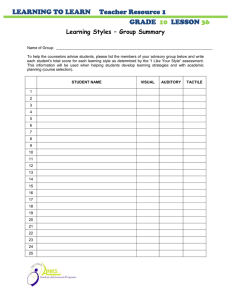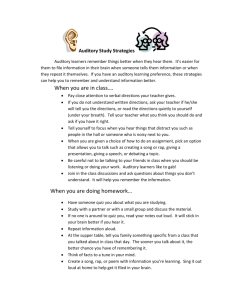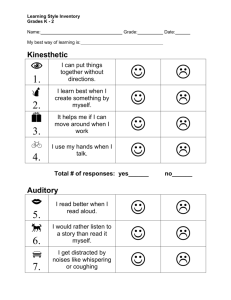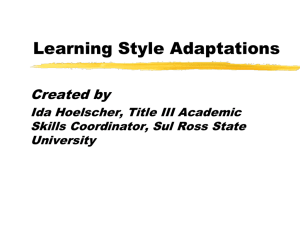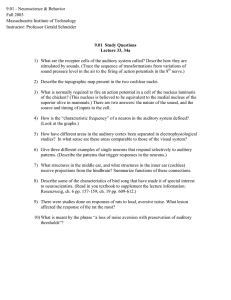LEARNING STYLES: AUDITORY This session introduces ways for
advertisement
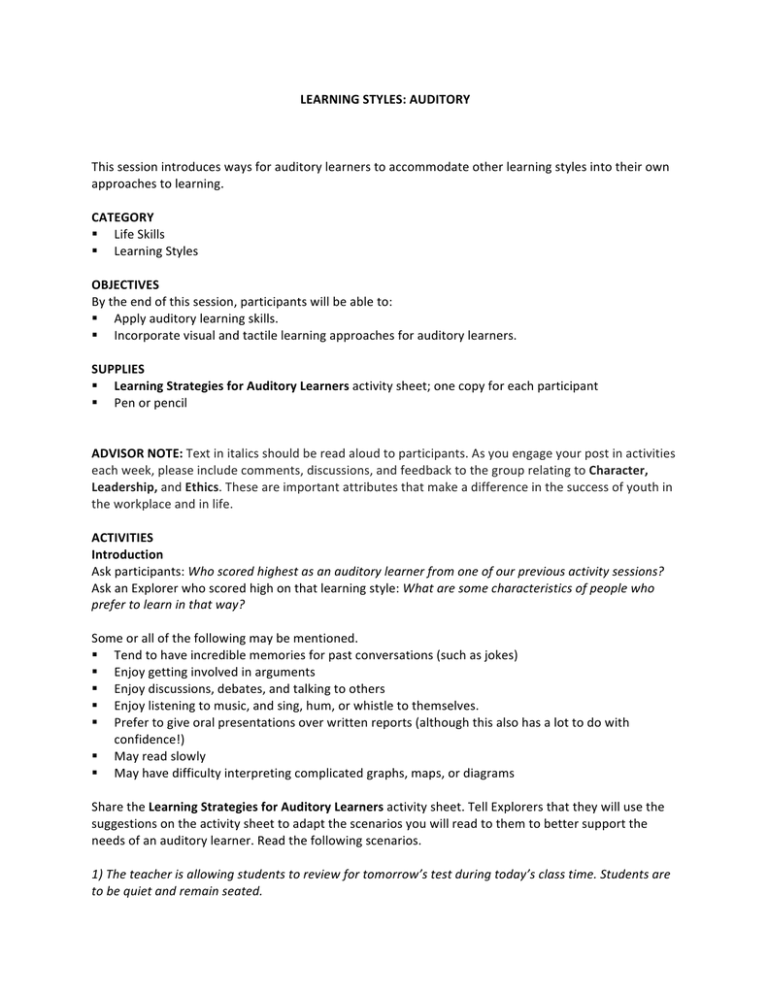
LEARNING STYLES: AUDITORY This session introduces ways for auditory learners to accommodate other learning styles into their own approaches to learning. CATEGORY § Life Skills § Learning Styles OBJECTIVES By the end of this session, participants will be able to: § Apply auditory learning skills. § Incorporate visual and tactile learning approaches for auditory learners. SUPPLIES § Learning Strategies for Auditory Learners activity sheet; one copy for each participant § Pen or pencil ADVISOR NOTE: Text in italics should be read aloud to participants. As you engage your post in activities each week, please include comments, discussions, and feedback to the group relating to Character, Leadership, and Ethics. These are important attributes that make a difference in the success of youth in the workplace and in life. ACTIVITIES Introduction Ask participants: Who scored highest as an auditory learner from one of our previous activity sessions? Ask an Explorer who scored high on that learning style: What are some characteristics of people who prefer to learn in that way? Some or all of the following may be mentioned. § Tend to have incredible memories for past conversations (such as jokes) § Enjoy getting involved in arguments § Enjoy discussions, debates, and talking to others § Enjoy listening to music, and sing, hum, or whistle to themselves. § Prefer to give oral presentations over written reports (although this also has a lot to do with confidence!) § May read slowly § May have difficulty interpreting complicated graphs, maps, or diagrams Share the Learning Strategies for Auditory Learners activity sheet. Tell Explorers that they will use the suggestions on the activity sheet to adapt the scenarios you will read to them to better support the needs of an auditory learner. Read the following scenarios. 1) The teacher is allowing students to review for tomorrow’s test during today’s class time. Students are to be quiet and remain seated. 2) During class, students are divided into groups of two. The groups will role-­‐play a job interview, with one person conducting the interview and one person being interviewed. 3) In science class, the teacher is reading from the book and reviewing the assignment with the students. 4) After reviewing each section of information, the teacher stops and conducts an experiment to demonstrate the lesson just reviewed. When possible, the teacher allows a student to conduct the experiment instead. Solicit feedback from Explorers after sharing each of the scenarios above. Close the session with the reflection questions below. ADVISOR NOTE Some sample questions are below. They are designed to help the participants apply what they have learned to their own interests. You are welcome to use these questions or develop your own questions that relate to your post or specific focus area. REFLECTION Focusing Questions § What did you learn from this activity? § How will you be able to take a non-­‐auditory experience and turn it into a positive, more “auditory” experience? § How will this help you engage and learn more by knowing what you know now? Analysis Questions § What was the greatest challenge you experienced in adapting the scenarios to a different learning style? Generalization Questions § How can today’s exercise help you in the future? § Why is this important? RESOURCES Learning Strategies for Auditory Learners § Sit near the front of your class. § With your instructor’s permission, record lectures to play back later. § Choose a place to study that allows you to read aloud or talk yourself through questions as you work. § Before beginning an assignment or a project, say out loud the learning outcomes you expect to achieve. § Skim new material before you begin reading. Then verbalize a basic outline of the reading, including an overview of the material and key sections. At the end, summarize out loud what you have learned. § Read aloud, especially when you encounter challenging text. Reread when needed or read to others. § Take notes on flash cards. Read aloud and review the flash cards repeatedly. § Record yourself reading aloud using your smartphone. § Play back lectures or recorded notes while you are getting ready in the morning, riding on the bus, etc. § Participate in study groups or find a study partner with whom you can discuss assignments. § When permitted, choose to present work through an oral presentation rather than through a written paper. § Remove distracting noises by playing white noise or wordless music when you study. § Create songs or pneumonic devices to help you remember key concepts.
